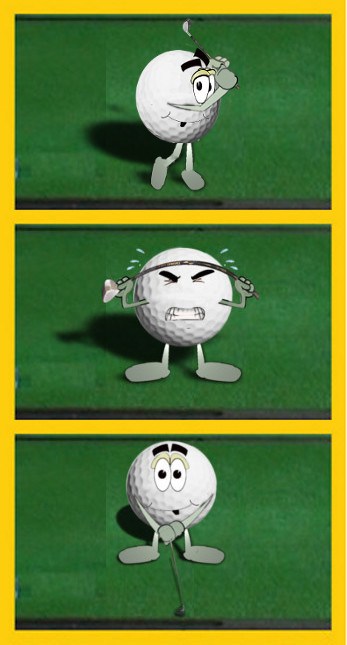
In Part I of this article, we defined mental toughness and listed several qualities shared by golfers who have it. Now, let's get to the task of improving your mental game in each of five key areas.
Confidence/trust in your swing
Obviously, confidence can't be manufactured on the spot or summoned at will. It must be built, in this case on the driving range, the practice green and the course itself. It's also important to build a mental file folder, if you will, of good shots and moments when you've risen to the occasion. They come in mighty handy when adversity rears its head.
Build confidence by practicing purposefully. Work on a specific shot (a fade, a knock-down) or swing movement (your shoulder turn, releasing the hands), and focus on this key with every swing. If you find yourself mindlessly hitting balls into the range, stop and refocus.
Random practice is another excellent way to build confidence on the range that carries over to the course.
A willingness to accept any circumstances presented
So you arrive at the course and it's cold and drizzling. Or windy. Or the greens are slow. Perhaps your ball hits a sprinkler head on the third fairway and bounces behind a tree. Or your opponent holes a series of long putts to put you in a bind.
What's the common denominator in all these situations? You can't do a darn thing to change them.
Too often, we allow less-than-ideal circumstances to be our “out,” an excuse for performing below standard. Mentally tough golfers don't ignore adversity – they embrace it. Next time you encounter an uncontrollable element or setback, take a deep breath and say to yourself, “Awesome – this will make me focus that much harder and play even better.” And mean what you say.
Control of your emotions
“You can never tell if he's winning the tournament or about to miss the cut.” You hear a version of this practically every time professional golf is on TV. With a few noteworthy exceptions, professionals keep an even keel whether their fortunes are up or down.
To develop a consistent temperament, you must recognize the impact of your emotional highs and lows. After draining a long putt or stringing together a couple of good holes, be wary of overstimulation. Maybe you start thinking about what you might shoot, or how you've finally got this game figured out. Now you're distracted, and in danger of making an unfocused swing.
On the flip side, many golfers have difficulty reigning in anger or frustration. Golf being a game of repeated failures – off-line drives, shots into hazards, missed putts – you must accept that you'll make a number of mistakes in every round. Treat them objectively, learn your lessons and move on.
The ability to focus only on things you can control
It's called “process vs. outcome” thinking, and it can be the most powerful weapon in a golfer's mental bag. Click the link to learn more.
A positive attitude in all situations
Like many aspects of mental toughness, staying ever-positive is easier said than done. But that's the whole point: Being tough means being able to overcome obstacles that derail others. In this case, the obstacles are internal.
Negative self-talk – cursing yourself over a lousy shot, belittling your own skills – is a dead end. Yes, Tiger Woods does it and still manages OK. Tiger Woods does a lot of things that defy conventional wisdom. And you'd better believe he uses every bad shot to motivate himself, positively, for the next one.
For tips on keeping your chin up on the golf course, click here.

Improve Your Mental Toughness Part Two
In a previous article, we tackled the difficult topic of mental toughness in golf. This is a challenging topic to address because so many players struggle with the mental side of the game – yet those problems are unique to each individual. No golf instructor can 'get inside your head' to know exactly what you are thinking, so this will always be a challenging area of your game to correct. However, it is a topic which is still worth your time and attention, as it is critically important to your success on the links.
In this article, we are going to add to the advice offered in Part One of this series. Although we can't know exactly what is going on in your head as you play, we do have a good idea of the mind games that the average golfer players while going through a round. Hopefully, at least some of the advice provided below will 'hit home' for you, and your overall game will be able to improve as a result. It is important to work on bettering your physical skills, of course, but it is just as important to make sure you are making progress on the mental side as well.
If you have not yet had a chance to read Part One of this series on mental toughness in golf, we highly recommend that you do so. However, if you would just like a quick summary of the key points made in that article, please review the list below.
- Mental toughness is important because golf is such a difficult game. Being mentally tough will help you to come back from a bad hole, it will help you to hold up under pressure, and it can even help you do a better job of dealing with distractions.
- Treating each hole as its own individual challenge is one of the best things you can do to improve your mental toughness. Also, you should accept the fact that bad things are going to happen from time to time in this game. Instead of getting mad, you can simply look for ways to overcome the poor shots and bad breaks.
- Practicing your mental toughness is just as important as practicing your physical skills. Using specific drills to make the game more difficult will help you when you get out onto the course and find yourself in a tough spot.
- Mentally tough golfers will not be worried about other people's opinions while playing the game. You should be too concerned with keeping all of your attention on the task at hand to be worried about what other people might be thinking or saying.
The first part of this article series will give you a solid foundation on which to build your mental toughness. We hope to expand on that foundation in this article so you will be even better equipped to rise to the challenges which present themselves on the links.
Any instruction contained below is written from the perspective of a right-handed golfer. If you happen to play left-handed, please take a moment to reverse the directions as necessary.

The Past Doesn't Have to Predict the Future
As you gain more and more experience playing golf, you are sure to run into plenty of situations which look familiar from past shots you have faced. This is especially going to be true if you play the same course over and over again. When you start to see things that look like other situations you have been in previously, you may start to expect the same outcome. Indeed, a player with a weak mental game will just assume that he or she will struggle on a given hole if that hole has given them trouble in the past. Of course, this kind of assumption is not only incorrect, it is downright harmful to your game.
It is important to remember that each time you swing the club is a new experience. Sure, you might be facing the same situation you have faced previously, but that doesn't mean you should be planning on the same outcome. If things happened the same way over and over again in golf, the game would get boring in a hurry. There is no reason to expect things to go the same way they have gone previously, so put that idea out of your head right away. You should always play golf with an open mind, and that means being open to the possibility that you will perform better in a given situation this time around.
One of the best ways to keep yourself from thinking in this negative manner is to approach each shot with the same attention to detail in the planning category. Even if you have faced a shot previously, and you think you know which club will be needed, it still makes sense to go through your routine to find the yardage and pick a club. By assuming you already know what to do, you will in turn make it more likely that the past will repeat itself. There is no need to go down that road. Instead, come into each shot with the open mindset mentioned above, and make decisions based on the information in front of you.
You also shouldn't expect the past to repeat itself when you are facing short putts during your rounds. Your mental toughness will be strongly tested when you face short putts, as these kinds of shots have a way of getting into your head. If you miss one early in the round, you will likely be nervous about them for the rest of the day. However, that one missed putt shouldn't change your opinion of your ability to hole out from short range. Maybe that first putt hit a bump in the green, or maybe you just misread it slightly. Whatever the case, your putting stroke isn't necessarily broken just because of one miss. Stay positive even when you face some struggles and always expect the best possible outcome on your next shot.

Mental Toughness in the Short Game
We mentioned the challenge of making short putts in the previous section, and we want to take this opportunity to move further into the discussion of the short game here in this section. The short game – which includes putting as well as chipping and pitching – is notoriously difficult, and can actually give many amateur golfers more problems than the long game. Not only do you need to have reliable technique on your side if you are going to perform well on and around the greens, you need to have your mind in a good place as well.
So what makes up mental toughness in the realm of the short game? The following points are critical –
- Willingness to play from a variety of lies. Of course, you don't have a choice about the kind of lie you are going to play from in the short game, but you do have a choice regarding your attitude. The nature of the short game is such that you are certain to draw bad lies from time to time – at least when you are chipping or pitching (you should always have a good lie on the green). There is nothing you can do to prevent yourself from getting a bad lie, but you can be prepared for this situation mentally. You shouldn't get mad when you find a bad lie around the greens, and you shouldn't give up, either. It is possible to play good short game shots from bad spots, as long as you practice and give your best effort in each situation. During your practice sessions, make sure to work on your skills from these tricky spots so you can be ready to deliver when it matters most.
- Bounce back from a bad shot. Just as you need to be able to get back on track after a bad full swing, you need to come back quickly from a poor short game shot as well. This is particularly important after you chunk a chip shot. It is common for amateur golfers to hit a chip shot fat from time to time – in fact, this even happens to the pros on occasion. The key here is to put this kind of mistake out of your mind as quickly as possible. The wasted shot is going to be frustrating, sure, but it will be even worse if you allow that mistake to linger on for several holes to come. The next time you face a similar chip shot, you shouldn't be thinking about the poor one you hit earlier – you should just be thinking about executing your technique properly as you did in practice.
- Focus amid the distractions. One of the big challenges which comes along with the mental side of the short game is trying to focus while you are standing within close range of your playing partners. Once you leave the tee, you are probably scattered around the hole as you make your way toward the green, so the putting surface is the place where everybody comes back together. Usually, at least one of the players in the group has something to say about the shot they just hit, or the lie they had in the rough. Whatever the case, it is easy to get distracted at this point. You don't need to remove yourself from these conversations – chatting with playing partners is part of the fun of the game – but you do need to focus on the task at hand when it is your turn to play. Having mental toughness means being able to block out the many distractions which can come up throughout a round of golf. Learn how to focus while on and around the greens and your performance is sure to take a step forward.
- Stay positive. If you find yourself chipping or pitching to the green, something has probably gone wrong on your previous shot. You were naturally hoping to hit the green in regulation, so you will be a bit disappointed when you wind up having to chip onto the putting surface before putting to save your par. When you miss the green, you need to do a good job of remaining positive and patience as you try to grind out the hole. Every golfer misses greens, so you shouldn't be too hard on yourself for winding up in this position. Relax, remain calm, and do your best to set up an easy putt for par.
It might be more important to be mentally tough in the short game than during any other phase of play. The short game has a way of 'messing' with your head that is not seen elsewhere on the links. Work on your ability to rise above the challenges you will face on and around the greens and you should see strokes disappear from your scorecard in short order.

Being Mentally Tough in a Competition
Many new golfers seem to think that you have to be an accomplished player to enter a tournament. That simply isn't true. There are golf tournaments designed for players of all skill levels, and in fact, the course you play most often probably has a few of these events throughout the year. If you are interested in playing in some competitions, simply ask in the pro shop during your next visit to the course. Chances are there will be an upcoming tournament or two to sign up for, even if you are not a highly skilled player.
One of the fun things about playing in golf tournaments is being able to test yourself against the rest of the players in the field. Greater than that, however, is the opportunity to test yourself against yourself. The game suddenly gets a bit harder when you are playing with something on the line, so you will find that you are not as relaxed during a tournament as you would be otherwise. The nerves that are going to set in will expose any weaknesses in your game. For instance, if you are a little shaky on short putts during normal play, you may struggle badly during a competition.
It is mental toughness which will allow you to rise to the occasion during tournament play. You have to be mentally tough to overcome your own weaknesses, and you have to be mentally tough to play your best even when you know others are competing against you. To help you thrive in such a situation, we have provided a few tournament tips below.
- Go through your normal preparation. To put your mind in the right place before you tee off, one of the best things you can do is simply stick with the routine you usually use before any other round of golf. If you like to get to the course early to hit some range balls, be sure to make time for that warm up period. If you prefer to arrive later and just hit some putts before walking to the first tee, that is okay as well. Keeping things as normal as possible will help you get into the right frame of mind for playing well.
- Keep to yourself. When playing in a competition, you will most likely be playing with people you don't know. That isn't a problem, but you should focus more on playing your best game than trying to make new friends. You should be polite and respectful, of course, but save the conversation for after the round is over. Keep your mind on the task at hand and do your best to perform at your highest level.
- Understand that this is a challenge. For the sake of this explanation, let's say that you usually shoot scores in the low 80s when you are just out playing a round with your friends. So what should you expect to shoot when you play in a tournament? Most likely, something in the high 80s or even low 90s. Golf in a competition is simply more difficult than golf with your friends – it's just that simple. But here's the thing – tournament golf is harder for everyone, so the playing field is even. You don't have to feel bad that you aren't quite playing up to your expectations, as that is not a surprise given the extra pressure that you feel. By expecting the challenge to be steep, you can avoid being frustrated when things don't quite go your way.
There is a good chance that you will fall in love with the excitement of tournament golf once you get a few rounds under your belt. Sure, you will be nervous the first couple times, but that nervousness will turn into adrenaline once you realize how great it feels to hit a quality shot under pressure. Even better than hitting a great shot under pressure, of course, is playing a great round. It might take a while to check off that accomplishment, but you will be pretty proud of yourself when you sign for a low score to finish near the top of the leaderboard.

A Summary
Mental toughness is probably not something that you think about too often when you are playing a round of golf. You are too busy trying to pick the right club, or trying to make a good swing, to worry about being mentally tough. However, the more you think about it, the more you will realize that this is an incredibly important aspect of golf. If you can have mental toughness with you as you head around the course, you will be able to set aside frustrations while playing some of the best golf of your life. Good players have more than just solid swing mechanics working for them – they also know how to rise to the moment when the going gets tough. Don't let golf get the best of you when you can use your mental strength to overcome obstacles and reach your goals.
While it is helpful to read about mental toughness in this article, the only way to make this something that is built into your game is to live it out on the course. You just have to make up your mind that you aren't going to let things bother you when going through your rounds. While those around you get upset about bad shots or frustrated over poor bounces, you will keep a level head and continue forward one shot at a time. It certainly isn't going to be easy to keep this positive attitude, but it is essential if you are going to live up to your potential as a golfer. Don't worry if you get off track from time to time and lose your positive, patient outlook. Forgive yourself for the mistake, relax, and refocus on staying in the right frame of mind to play great golf.
One of the things you are going to need to do in order to maintain your own mental toughness is to ignore the complaints and problems experienced by other golfers. For instance, if you are playing on a day where the pace of play is rather slow, don't let other players pull you into the cycle of complaining. Rise above the 'noise' and just keep yourself focused on executing great swings. Allow the others to complain if they wish, but keep to yourself and don't let their complaints get in the way of you striving for your goals. Golf is a major mental challenge, but it is one which can be conquered when you are mentally stronger than those around you.
Thank you for taking the time to read this article, and hopefully the previous article in this series. We know that golf is a passion for many people around the world, and we hope that the advice provided in these pieces on mental toughness will help to take some strokes off of your game. In addition to playing better golf, being mentally tough should allow you to simply have more fun as well. Good luck out there!






